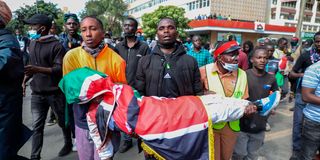Premium
MPs attack BBC over ‘Blood Parliament’ documentary
Members of Parliament have hit out at the British Broadcasting Corporation (BBC) over its documentary titled Blood Parliament, saying it’s meant to paint Kenya negatively.
The lawmakers accused the BBC of turning a blind eye to atrocities going on in other parts of the world, including the killing of children and women in Gaza and only focusing on Kenya.
The matter was raised by Mandera North MP Major Bashir Abdullahi, who complained that despite the report giving parliament a bad name, it is also interfering with the reconciliation that has been going on in the country since the June 25, 2024, killings.
“We sympathise with those who were killed. It's unfortunate, but people all over the world have been killed. People were killed in the US at Capitol Hill, in UK-London people have been killed, children and women are being killed in Gaza, and the BBC has never spoken about it,” Mr Abdullahi said.
“They have never spoken about the genocide in Gaza, yet it is a world service. Let’s not clap hands for foreigners as they paint our country as a discriminatory society,” he added
Dagoretti South MP John Kiarie claimed that the investigative story was fuelled by a condition put by parliament during the ratification of the agreement between Kenya and the UK on the British Army Training Unit Kenya (BATUK) that soldiers training in the country who commits any atrocity will be charged locally.
“The BBC is funded by taxpayer money in London. We want to know if the BBC is a mouthpiece of Britain or if they are trying to push a rider we placed on the treaty,” Mr Kiarie said.
“There could be an ulterior motive being pushed by this story. Because I know as a media practitioner that there is no story without a father or mother,” Mr Kiarie added.

Demonstrators carry the body of a protester who was shot dead at Parliament Buildings during anti-government protests in Nairobi on June 25, 2024.
Mr Kiarie maintained that Parliament will not relent on its push for the British soldiers who commit atrocities such as killing, maiming or raping any Kenyan citizen to be tried locally.
“We will not keep quiet on this issues, those soliders who kill, maim and rape our people must be tried here,” Mr Kiarie said.
However, Suba North MP Millie Odhiambo cautioned her colleagues against jostling to be politically right and should instead address the underlying issues causing the young people to be angry.
“There is one thing we have not dealt with, the trauma .We have a very angry generation, let parliament take the lead and help these young people to heal,” Ms Odhiambo said.
Ms Odhiambo, who is also the Minority Whip, said almost one year after the events took place in parliament, the anger among the young people is still there and can be fuelled anytime.
“The young people are still walking with anger and we don’t know when someone else will fuel the anger. Let parliament take the lead and help these people,” Ms Odhiambo said.
Ms Odhiambo said, despite having an issue with the title of the documentary piece, she said parliament should discuss the matter soberly.
Also Read: Opposition, civil society pile pressure for action against rogue officers who killed protestors
There was no direction on the matter as the speaker of the National Assembly, Moses Wetang’ula, did not comment on it.
The BBC documentary exposing police officers who shot dead protestors at last year’s anti-tax demonstrations at Parliament buildings in Nairobi was set to be publicly streamed on Monday, but was put on hold by authorities.
Authorities at the BBC say investigators said they analysed more than 5,000 images to piece together the sequence of events on June 25 and the placement of both the victims and the shooters.
The Independent Policing Oversight Authority (IPOA), which investigates complaints of police misconduct, on Monday said it had completed 22 investigations out of the 60 deaths reported.
According to IPOA, it is pursuing 36 other cases, while two were in court. Two files were closed internally, three were closed following directives from the Office of the Directorate of Public Prosecutions (ODPP), while four others remain in the DPP's office.
The authority chairman, Issack Hassan, said they recorded 233 injury cases during the demos, and blamed non-cooperation from police officers and witnesses for hampering the progress of their investigations.


